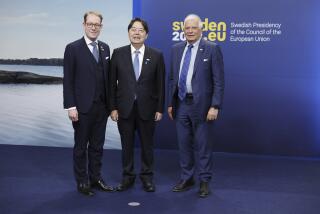Japan’s Leader Visits Beijing to Ease Ire Past and Present
- Share via
BEIJING — Japanese Prime Minister Ryutaro Hashimoto arrived in China on Thursday for a four-day tour to try to defuse angry memories of past wars, dispel fears of future conflicts and build the safe common ground of trade.
Hashimoto and Chinese Premier Li Peng met for more than two hours at the Great Hall of the People, where the two leaders signed several accords that included $1.68 billion in loans from Japan to China.
Hashimoto’s visit is timed to mark the 25th anniversary of Sino-Japanese ties. But the trip also comes at a time of Chinese complaints about Japan’s expanding security alliance with the United States, and of renewed condemnations here of Japanese wartime atrocities.
At the top of Hashimoto’s agenda: to reassure China that even though Japan has agreed to provide more support for U.S. forces in the region, it is not taking sides in tensions between China and Taiwan, a Japanese Foreign Ministry spokesman said. Li has termed “utterly unacceptable” new guidelines for the U.S.-Japan alliance that are to be unveiled this month.
The Japanese prime minister “will explain to China that the Japan-U.S. security alliance is a stabilizing factor in East Asia,” the Foreign Ministry spokesman said Thursday. Hashimoto proposed more top-level meetings, especially military exchanges, to increase mutual trust, the spokesman said.
Today, Hashimoto will meet with Chinese President Jiang Zemin and other top officials to discuss issues including regional stability and Japan’s support for China’s bid to join the World Trade Organization. On Saturday, he will head to Manchuria, in China’s northeast, a region once occupied by Japan. Manchuria has thrived with the help of Japanese investment.
In the industrial city of Shenyang, after tours of Japanese joint ventures and toasts to future cooperation, Hashimoto probably will make a bow to the ghosts of China and Japan’s past. During a visit to a monument marking the 1931 Mukden incident that launched the Japanese takeover of Manchuria, Hashimoto is expected to express remorse about Japan’s wartime brutality. There is speculation that, for the first time, he also may apologize for Japan’s infamous Unit 731, which conducted gruesome biological warfare experiments on living Chinese prisoners.
Chinese activists, who say Japan has done little to acknowledge or apologize for wartime atrocities, filed a lawsuit in Tokyo last month demanding compensation for victims of Unit 731. Beijing, which weighs nationalistic sentiments against its need for Japanese investment and aid, has officially discouraged the campaign.
Japan’s relationship with China--its largest trading partner--demands a delicate balance. Hashimoto’s diplomatic mission this time is to establish Japan as a strategic counterweight to a fast-growing China while tempering Beijing’s long-standing anger about Japanese wartime aggression.
More to Read
Sign up for Essential California
The most important California stories and recommendations in your inbox every morning.
You may occasionally receive promotional content from the Los Angeles Times.













